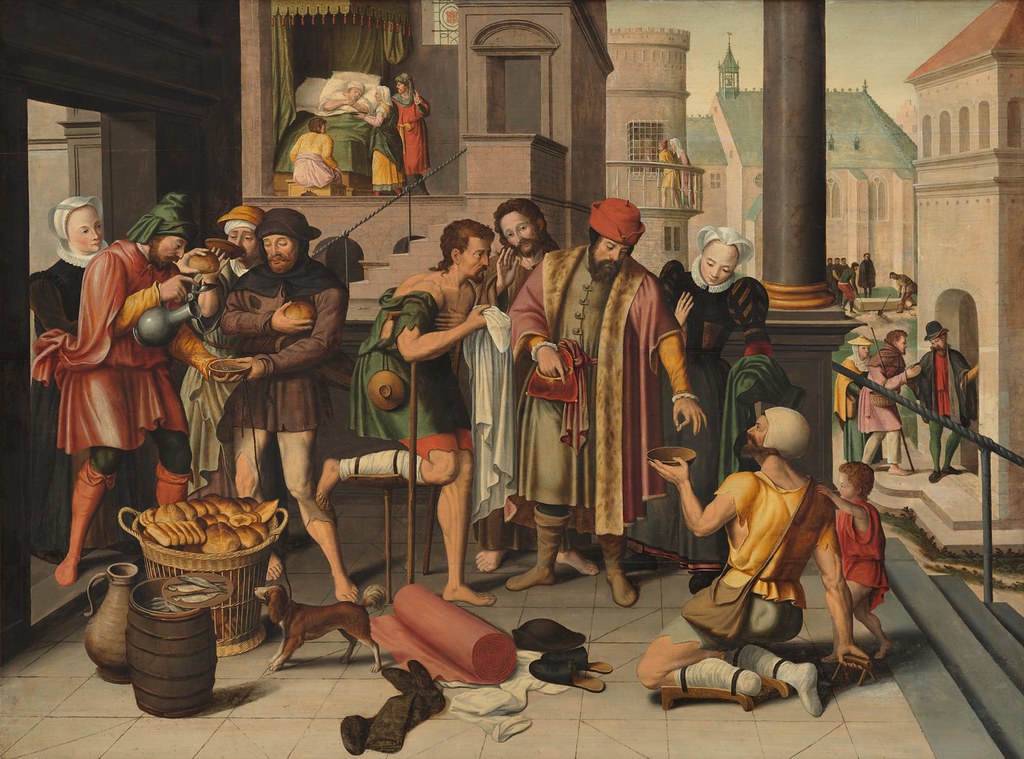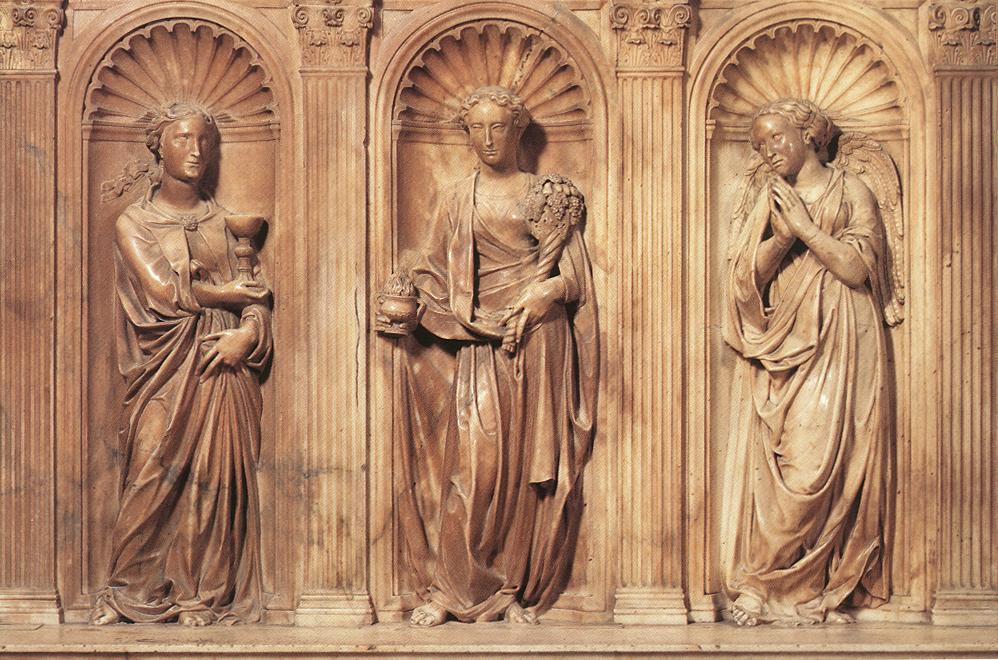Now I know that there are many of you who are just naturally charitable. You easily empathize with the suffering of others and you have a spontaneous instinct to do anything you can to help others carry their crosses and lighten their burdens.

Whether sheltering and feeding the rest of us in our travels, lending money to us in times of need, visiting us when we are sick, befriending us in times of trouble and comforting us in our sorrow, you are prepared for all good works without counting the cost.

What’s more, you cheerfully look for ways to be more charitable. You most certainly do not recognize your own charity, nor do you keep a record of your charitable actions.
This does not describe me. Set me down as one who calculates the cost and counts the liabilities incurred by every single reluctant and grudgingly performed “good deed.” Like water from the rock, some of us actually do have difficulty squeezing genuinely selfless actions from our stony hearts.

Nonetheless, I do love to learn about virtue. For example, I love thinking about the definition of virtue that Saint Augustine gives when he says,
Virtue is a good quality of the mind, by which we live righteously, of which no one can make bad use, which God works in us, without us.
That is a great definition of virtue and I enjoy knowing it very much. Let me tell you why.
Saint Thomas Aquinas demonstrates how this definition is excellent because it is complete. Why is it complete?
Why? Because it contains all of Aristotle’s four causes!

You remember those four causes right? Why, of course– the form, the matter, the maker, and the purpose.

First, virtue is a “good habit.” That is what it is. Good habit is the “form” of virtue just like the shape is the form of a statue.
Second, although virtue is not made out of any specific kind of matter like plastic, wood or metal, virtue does exist in the mind just like the shape of a statue exists in marble.
So we will say, without stretching the meaning too far, that the phrase “of the mind” is adequate to hold the place of the material cause of virtue.
Third, the words “by which we live righteously” give us the purpose or end of virtue. The purpose of virtue is to enable us to live excellently. Moreover, the very word virtue comes from the Latin word which means excellence.
Finally, what is the “making cause” of virtue (more sophisticated philosophers call it the efficient cause)?
Well, according to St Augustine’s definition, God is the cause of our virtue. He “works virtue in us, without us.” This is especially the case with the three Theological virtues which we receive at Baptism–Faith, Hope and Charity.

But when it comes to the natural virtues (like Prudence, Justice, Temperance and Fortitude), we can justly be said to acquire those on our own. We ourselves can produce virtue by repeated good acts.
Now my point is this. I really enjoy thinking about virtue. I enjoy thinking about what it is and explaining it to others. But does this make me virtuous? If only that were the case!
One far wiser and brighter than myself might descend even a little further and divide all the virtues into intellectual virtues and moral virtues. Perhaps he could enumerate all the virtues in each category and even define each according to its respective causes. I would love to be able to do this!

But would that make me virtuous? I wish!
I happen to know St. Thomas Aquinas’ teaching on the nine effects of charity. Here they are- I will write these with both eyes closed:
The Nine Effects of Charity
- If one is charitable, he is endowed with spiritual life because charity is none other than God’s union with the soul. And just as the soul is the life of the body, so is God the Life of the soul.
- Charity enables us to observe the Commandments, because Christ says If any one love Me, he will keep My word (i.e. commandments).
- Charity is a bulwark against adversity. For the lover, no mountain is too high to climb, no dragon is too dreadful to slay, no obstacle is too difficult to overcome for the sake of one’s beloved. The same goes for those who love God!

- Charity bestows happiness on us. For eternal happiness is only promised to those who have charity.
- Our sins are remitted through charity, for “charity covereth a multitude of sins” and in Proverbs it says “charity covereth all offenses.”
- By charity, our hearts are illumined because in Sirach we read, “Ye that fear the Lord, love Him, and your hearts shall be enlightened.”
- Charity produces perfect joy because by charity we are united with the cause of perfect joy. Because we read in John, “Whoever remains in charity remains in God and God in him.”
- Charity bestows perfect peace because by charity we abide in God and St. Augustine says in his Confessions, “You made us for You, Lord, and our heart is not at rest until it rests in You.”
- And finally charity bestows great dignity on us because Our Lord says to those who love Him “I no longer call you slaves/servants… but friends.”
There! That was easy. I bet I could do those backwards. Nonetheless, although it gives me great delight to think about each one of these, I am struck by the sad fact that in knowing the nine effects of charity I am still not charitable!
How can this be? I count myself as one of the lucky few who through some attention to my liberal education can explain Aristotle’s four causes. I can define virtue completely. I can teach and explain what charity is and its nine effects…and yet I am still not virtuous, nor have I received any awards for my noteworthy charity.
The Apostle warns about the difference between knowledge and virtue when he says,
If I speak with the tongues of men, and of angels, and have not charity, I am become as sounding brass, or a tinkling cymbal. And if I should have prophecy and should know all mysteries, and all knowledge, and if I should have all faith, so that I could remove mountains, and have not charity, I am nothing…

And of course Newman, the Apostle of Liberal Education, famously repeats this sentiment saying,
Knowledge is one thing, virtue is another; good sense is not conscience, refinement is not humility, nor is largeness and justness of view faith. Philosophy, however enlightened, however profound, gives no command over the passions, no influential motives, no vivifying principles. Liberal Education makes not the Christian…

But at least I can say this: Although the liberally educated person may not himself be virtuous, he is at least able to love virtue. One cannot love something which one does not know. The liberally educated person is able to know what charity is and its effects and therefore he is at least able to love charity.
Although knowledge is not the same as virtue, I dare hope that he who has the knowledge of what charity is will at least, insofar as his knowledge goes, have a greater disposition to possessing the virtue itself.





Well said! How many times I have been in conversations with a wonderfully educated person and found them disdainful and condencending in their attitude towards lesser mortals. Charity is not knowlege, but practiced.
An ethical man knows that he should not sleep with his neighbour’s wife – A moral man would not sleep with his neighbour’s wife.